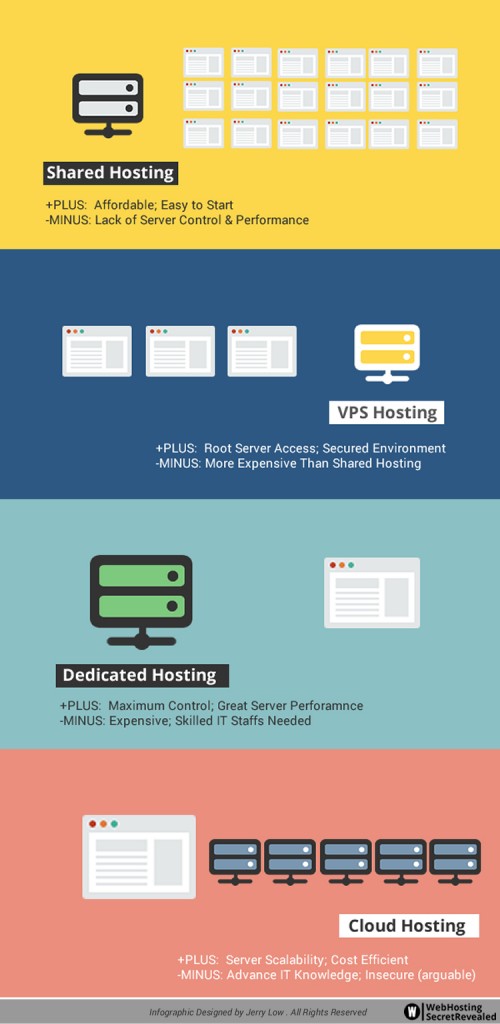Your Options in Web Hosting
In general, there are four main types of web hosting: Shared, Virtual Private Server (VPS), Dedicated, and Cloud Hosting. All these hosting types serve as storage for your web content (html files, videos, audio, images, apps, databases, etc.), but they vary in storage capacity, control, technical knowledge needed, server speed, and reliability. Each option comes with its own advantages and disadvantages.
Compare Shared, VPS, Dedicated, and Cloud Hosting
Shared Hosting
When a website is hosted on a shared hosting, the site is placed on the same server as many other sites, ranging from a few to hundreds or thousands. Typically, all domains may share a common pool of server resources, such as RAM and the CPU. As cost is extremely low, most websites with moderate traffic levels running standard software are hosted on this type of server. Shared hosting is also widely accepted as the entry level option as it requires minimum technical knowledge.
Virtual Private Server (VPS) Hosting
In VPS hosting, every website is hosted on a virtual private server on a more powerful hardware. A physical machine is divided into several virtual compartments, and server software is set up on them separately, making each unit capable of functioning independently. Thus, though other websites may be hosted on the same physical system, yours would be the only website(s) hosted in the virtual compartment allocated to you, and other websites on the machine won’t affect the performance of yours. That would mean you get exactly the same system resources you pay for.
Dedicated Hosting
A dedicated server offers the maximum control over the web server your website is stored on – You exclusively rent an entire server. Your website(s) is the only website stored on the server.
Cloud Hosting
Cloud hosting offers nearly unlimited ability to handle high traffic or traffic spikes. Here’s how it works: A team of servers (called a cloud) work together to host a group of websites. This allows multiple computers to work together to handle high traffic levels or spikes for any particular website.
How to choose?
To choose the right web host, you have to first understand your own needs. Let’s forget about those list of top 10 hosting services for a while and think thoroughly about your very own needs.
- What kind of website are you building?
- Do you need Windows applications?
- Do you need a special version of software (ie. PHP)?
- Does your website need special software?
- How big (or small) can the web traffic volume go?
- Do you plan to host multiple websites on the same hosting account?
- Is security a primary concern?
- Do you need a dedicated IP for your site?
- Is private SSL certificates needed?
- How fast do you need the hosting server to be?
- Do you need server root access?
- Do you need to install your own software and application?
These are some of the basic questions to be answered. Have a plan with your website and try figure out what will happens next for the next 12 months.
For newbies, the general basic rule is to always start small with a good shared hosting account. A shared hosting account is cheap, easy to maintain, and sufficient for most new sites. Plus, you can always upgrade to VPS or dedicated hosting in the later stage when your site grows bigger.
